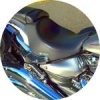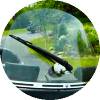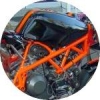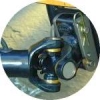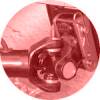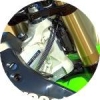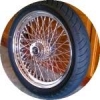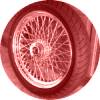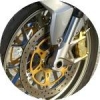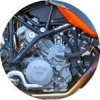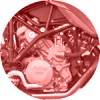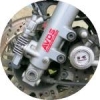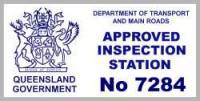Queensland Department of Transport and Main Roads introduced the safety certificate in November 1999 to replace the old roadworthy certificate or RWC, and it became
mandatory to obtain and display a current safety certificate on any registered motorcycle from the moment it's offered for sale.
The only times it's not required to display current safety certificate on a motorcycle for sale is when the motorcycle's either unregistered or is traded to or
between licensed motor dealers.
Queensland Department of Transport and Main Roads safety certificates can only be issued by Approved Inspection Stations (AIS), being service stations, garages or
workshops approved by Queensland Department of Transport and Main Roads to conduct inspections.
For private motorcycle sellers, Queensland Department of Transport and Main Roads safety certificates must be issued in the two months or 2000 kilometres prior to
sale, whichever comes first.
You are required to display a safety certificate in a conspicuous place and for motorcycles it's either on the forks or front guard.
Failure to display a Queensland Department of Transport and Main Roads safety certificate on the motorcycle from the time it's first offered for sale can carry an
on-the-spot fine penalty of $550.
Information on this website relating to motorcycle inspection is drawn from the Queensland Department of Transport and Main Roads Code of Practice for Approved
Inspection Stations (AIS) and Approved Persons; guidelines followed during safety certificate inspections and vehicle modification certification.
Following the code of practice guidelines below and rectifying faults you uncover should assure your motorcycle will pass on first inspection, avoiding any inconvenient
and possible costly re-inspection.
Vehicle inspection is subjective and the guidelines open to varying interpretation from inspector to inspector. Below is a list of reasons for possible rejection
pertaining to Vehicle Safety Features for the issuing of a Queensland Department of Transport and Main Roads safety certificate (formerly roadworthy certificate or
RWC).
SECTION 10 - VEHICLE SAFETY FEATURES
For well over 40 years, motor vehicles have been fitted with traditional safety features such as seatbelts, collapsible steering columns and lighting systems. However,
with advancements in technology and the desire for safer motor vehicles, more complex safety systems have been designed and fitted to the modern motor vehicle.
These systems provide a host of safety features to protect vehicle occupants and other vulnerable road users in the event of a crash. They also provide safety features
that assist in preventing or reducing the severity of a crash. These safety features are divided into two categories, namely, active safety features and passive safety
features.
Active safety features are designed to help avoid accidents and include such systems as Electronic Stability Control, Anti-lock braking and Electronic Brake force
Distribution. Passive safety features are designed to help reduce the injuries to vehicle occupants and include such systems as airbags, seatbelt pretensioners and brake
pedal detachment.
These safety features are generally complex and rely on a number of other vehicle systems to perform their intended function correctly. The manner in which these safety
features operate can also vary between manufacturers and, as such, it is important to have access to manufacturer's specifications.
In this section:-
Active safety system includes electronic stability control (ESC), traction control, anti-lock brake system, electronic brake-force distribution and automated
emergency braking systems.
Passive safety system includes airbags, seat belt pre-tensioners and seat belt load limiters (webbing clamp).
10.1 ACTIVE SAFETY FEATURES
Possible reasons for rejection at inspection:
- Where provided by the vehicle manufacturer, active safety system is damaged, has components missing or the system does not operate
within the manufacturer's specifications. (See Note 1)
- A detachable pedal (i.e. brake pedal) has been triggered, is damaged or has not been repaired as per the manufacturer's
specifications.
10.2 PASSIVE SAFETY SYSTEMS
Possible reasons for rejection at inspection:
- An airbag installed by the vehicle manufacturer is not fitted or operating within the manufacturer's specifications. (See Note 1)
- A seatbelt pre-tensioner has been deployed, is missing, inoperable or damaged. (See Note 1)
- A seatbelt load limiter (webbing clamp) has been activated, is damaged or has not been repaired as per the manufacturer's
specifications. (See Note 1)
Notes about Section 10 (Vehicle safety features):
[1] Due to the complexity of the system's components and their operation, it will be acceptable to rely on the vehicle's fault code logging system as a means
of indicating that the system is operable (unless other aspects of the inspection indicate that the system is damaged or not operable).
Please be aware there is no requirement to check the performance/operation of the system during a road test. Under no circumstances is it permissible to operate the
vehicle in a dangerous manner or in a way which contravenes Queensland law.










